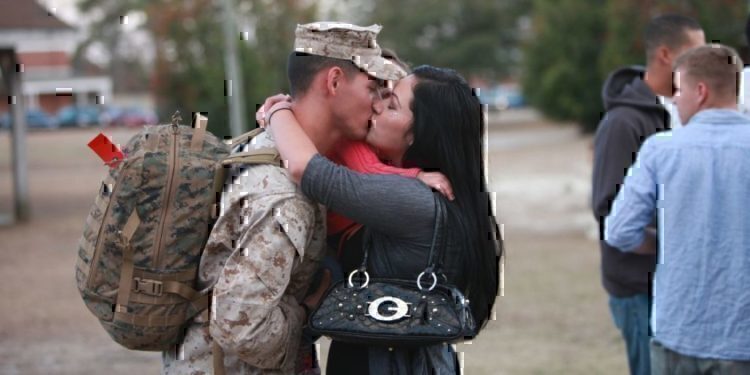Article Credit: JoMyGosh.com
No matter what you think about the movie American Sniper, it has people talking and bringing our Service Members and our Veterans into the foreground. And, some Veterans feel that the movie got it right, validating their experience. Our Service Members and Veterans should be acknowledged for their service and sacrifice.
And, so should their Families. I believe that Families should also be recognized, that our heroism deserves notice.
I didn’t always have this perspective. Before my (now) husband deployed to Iraq in 2004, I had no idea what it was like to have a loved one in a combat zone. The most I got from popular culture was a girl on a porch looking sadly at the sky.

When Brian left, each day felt like an eternity. I pretended to be strong, but as time wore on, my body started to betray me. My back went out. I became so tense that I couldn’t breathe without it hurting. I berated myself for being so weak. Here, Brian was at war, and I was falling apart. And, no one seemed to understand. Though Brian was active duty, he was with a Reserve unit. I was immersed in a civilian community for which the war was not an everyday reality. I felt isolated and alone.
A few weeks before Brian was due to return, I attended the Homecoming Briefing. There, I learned that my issues were normal under the circumstance. I was relieved and angry at the same time. So, I wasn’t the weak person I was painting myself to be, great. But, why didn’t I have this information SOONER! It would have helped.
And, how was it possible that I didn’t know about this experience in general? We have fought war for centuries. There are so many movies about war. Where was the perspective of the family? the spouse? The parent?
Joyously, Brian came home safely. And, we were blessed that he showed no signs of Post Traumatic Stress. I thought that this would be the end of it. That we would move on.
But, I still cried listening to the news – others were still over there. I couldn’t watch any war movies without sobbing. To me, it was all too real. And just like I had no idea what it was like to go to war, Brian had no idea what it was like to be home living in fear. Our experiences were, obviously, totally different.
I realized that I could help others.
About a year later, I read the book While They’re At War by Kristin Henderson. It was the first time someone was relaying what I had gone through. The walls of my fortress started to come down.
Also, I realized that I could help others. I was a news producer and a documentary filmmaker. I could get valuable information out, help families know that they weren’t alone, and bring to light the bravery it takes to be on the home front.
By showing what it was like to be a spouse at home ‘holding down the fort’, to be the parent afraid to answer the door when the bell rings a little too early in the morning, and how long it can take to heal, families would know what to expect. I believed knowledge is power, and that much of the trauma was both preventable and treatable.
In 2007, I used my life’s savings and began crafting my documentary. I called it While Time Stands Still because that is what it felt like while Brian was gone. My plan was to follow a couple of spouses, so I could capture their journey, and to talk to families of all branches in order to convey a full picture of the effects of wartime deployment.









